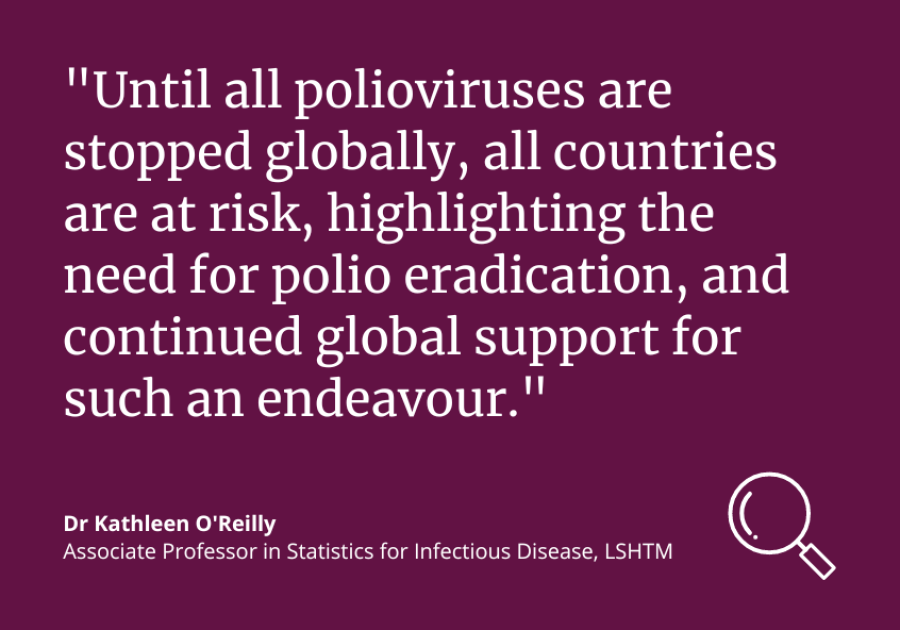Expert comment - polio vaccine for children aged one to nine in London
10 August 2022 London School of Hygiene & Tropical Medicine London School of Hygiene & Tropical Medicine https://lshtm.ac.uk/themes/custom/lshtm/images/lshtm-logo-black.png
Dr Kathleen O'Reilly said: "Until all polioviruses are stopped globally, all countries are at risk, highlighting the need for polio eradication, and continued global support for such an endeavour.”
Following the discovery of poliovirus in sewage in North and East London, the Joint Committee on Vaccination and Immunisation (JCVI) has advised that a targeted inactivated polio vaccine (PIV) booster dose should be offered to all children between the ages of one and nine in all London boroughs.
Dr Kathleen O’Reilly, Associate Professor in Statistics for Infectious Disease at the London School of Hygiene & Tropical Medicine (LSHTM), and expert in polio eradication, said: “I think that the polio booster is a very good plan – sewage surveillance has provided us with information about poliovirus circulation and a critical opportunity to vaccinate children to prevent disease spread. In these investigations, poliovirus has been detected in several sewage samples from the north London area over a number of months.
“Genetic sequencing indicates that all the samples could be related to each other and suggests infections have gone beyond a few individuals. The sewage sampling has been extended and these investigations have been very helpful in understanding the epidemiology of this incident, but also illustrates that circulation is wider than originally thought. Based on this information, sewage sampling elsewhere in the country is needed, and opportunistic stool sampling is needed to better understand who is at risk to help target vaccination activities.
“Vaccination is the best course of action to prevent disease. The UK vaccinates against polio using the ‘inactivated’ vaccine (called the IPV) where there is no risk of onward spread and the vaccine is very safe. As the epidemiology of this situation progresses, the use of other vaccines that are better designed to prevent infection may need to be explored.
“Vaccine-derived poliovirus is present in many countries across the world, especially within the African continent and some countries in Asia. The origin of vaccine-derived poliovirus is from certain versions of the live oral polio vaccine, which are used in a small number of countries. The poliovirus circulating in London is genetically related to virus found in a recent polio case in the USA, and in Israel. Further investigation is needed to fully understand how they are connected, but it does illustrate that this virus has the potential to cause disease, especially in poorly vaccinated communities. Until all polioviruses are stopped globally, all countries are at risk, highlighting the need for polio eradication, and continued global support for such an endeavour.”
If you enjoyed this article and would like to build a career in global health, we offer a range of MSc programmes covering health and data, infectious and tropical diseases, population health, and public health and policy.
Available on campus or online, including flexible study that works around your work and home life, be part of a global community at the UK's no.1 public health university.